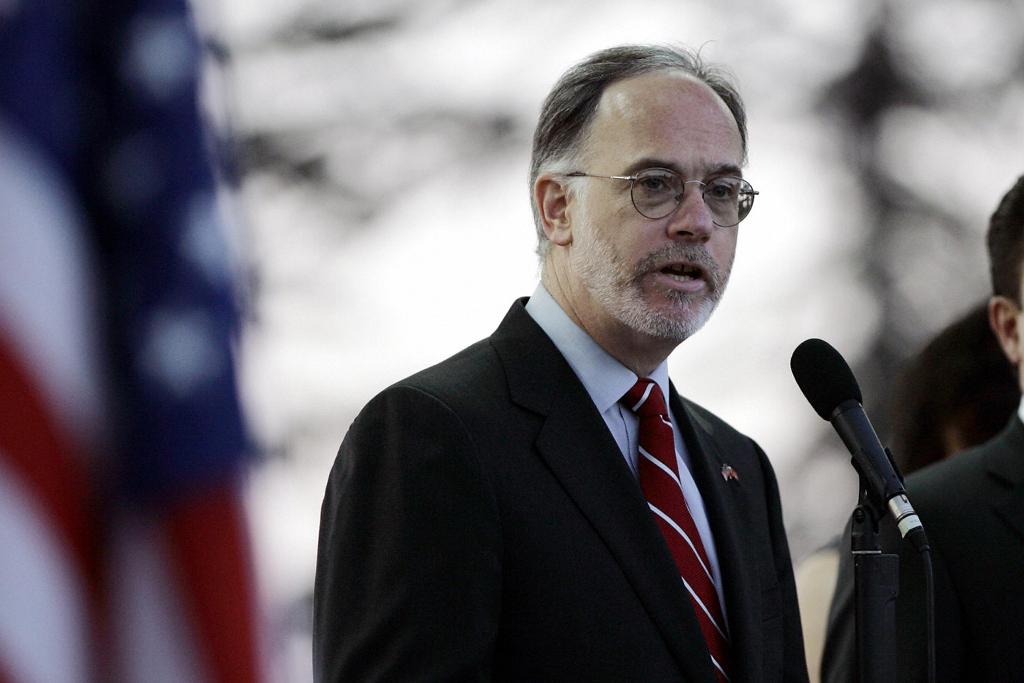Syria is ‘spinning out of control’ and the Turks need help
Former US Ambassador to Turkey Ross Wilson
Immediately after Syrian mortars killed five civilians in a Turkish border town on October 3, former U.S. Ambassador to Turkey Ross Wilson stated that the incident "added a new edge to the campaign [Turkish Prime Minister Recep Tayyip] Erdogan’s administration has been waging to convince its allies and friends that Syria is spinning out of control, increasingly threatening regional peace and stability, and warranting a firmer response."
Turkey responded to Wednesday's incident by shelling parts of Syria all night and passing a resolution that authorizes sending its military into Syria if necessary.
Wilson told Business Insider that he wasn't surprised Turkey sent its neighbor "a strong statement that they're not interested in seeing this happen in the future," but noted that Turkey shouldn't have to deal with the Syria problem alone—"NATO needs to do more to contain and isolate this problem as much as one can."
"The way it's seen in Turkey is that disorder [and] chaos are increasing weekly if not daily in Syria," Wilson, who served in Ankara from 2005 to 2008, said, "They are extremely worried about what the medium-to-longer term future is. Turkey can defend itself in this kind of border incident. Larger scale things [are] something else altogether and Turkey is seeking help."
According to Wilson, Turkey is primarily worried about three big issues:
1) Chemical weapons: "They seem dangerous enough to American national security officials, but to Turkey they're literally right across the border. It's not something far away that might come to bite at some point in the future. It's a very immediate and very real threat."
2) The rising al-Qaeda presence over the last six weeks: "To a certain extent, [Turkish leaders] know how to deal with the Kurdistan Workers Party (PKK), which was very much in the news two months ago operating in the far east of Syria. Al-Qaeda is a whole different set of problems and that alarms them."
3) The implosion of the Syrian government, which would lead to "chaos all over the country, hundreds of thousands of refugees fleeing for their lives and the implications of that for Turkey and the region as a whole."
Wilson said that there are clear signs of increasing chaos: the Syrian government is losing parts of the country, senior military officers have defected, rebels have successfully attacked central government buildings and 90,000 Syrian refugees are currently living in Turkey.
"As far as Syria is concerned, clearly there needs to be some kind of transition [in the form of a interim government] there and it has to happen soon or the situation domestically is going to become something akin to that nightmare that the Turks are so concerned about," Wilson said.
That nightmare scenario would involve a collapse of central and military authority combined with the "loss of control of these frightening weapons that Assad and his father developed over the course of many years." The result would be "catastrophic flows of refugees [and] catastrophic numbers of people to feed and take care of medically" in addition to the destabilization of the entire region.
"It's already an extremely volatile part of the world—it could get a lot moreso and a lot more dangerous," Wilson said. "It could be very quickly or it could be sometime off in the future but it almost seems inevitable that some big change is going to happen in Syria."
That's why, Wilson told us, it is critical that NATO and it's individual member states "make clear that's [Turkey's] security is an alliance concern" in addition to supporting "Jordan and … others who are affected by this instability that … ultimately may threaten the whole region."
He said the benefit of doing so is twofold: it's a way to contain the instability while also ensuring that "NATO has a platform, i.e. Turkey, if and when at some point circumstances develop further in Syria in such a way that either intervention or some kind of operation on the edges of Syria or along its borders becomes necessary."
Wilson noted that world leaders have been wise to resist direct intervention in Syria, but that doesn't mean Turkey's allies "should be passive with respect to the overall situation. That's where I think NATO needs to pick up it's game."
When asked to speculate on what happens next, Wilson said that it's "almost an impossible question to answer," but did offer a basic scenario:
"At some point it's likely that the [Syrian] government will either enter into some sort of transition on its own or it will collapse. Is that this winter? Is it later? I don't know. I think it's extremely difficult for Assad to put things back to the way they were, but when things will play our or exactly how I don't know."
One thing is certain: winter is coming. "It will be cold, people won't have food and what is already a deeply suffering country will be suffering quite a bit more," Wilson said.
More from our partner Business Insider:
Business Insider: Jack Welch: I'm not kidding
Business Insider: Obama gains a point on Mitt Romney after the debate, leads 50-45
Business Insider: Consumer credit destroys expectations
Business Insider: Hugo Chavez might lose this weekend's election in Venezuela
Business Insider: Can you have a recession if services are expanding?
Every day, reporters and producers at The World are hard at work bringing you human-centered news from across the globe. But we can’t do it without you. We need your support to ensure we can continue this work for another year.
Make a gift today, and you’ll help us unlock a matching gift of $67,000!
